BOARD OF DIRECTORS
Role and function—The Board of Directors makes decisions jointly and, for specific matters, is assisted by Board committees. The Board's primary function is to provide guidance and exercise control over the Group. The Board makes strategic decisions and defines the general means for achieving the goals it has set for the company. It sets the agenda for the General Meeting and approves the annual and half-year reports as well as the compensation report. Decisions regarding the appointment of members to the Group Management, the Extended Group Management, the Managing Directors of subsidiaries as well as the nomination of the statutory auditor for election at the General Meeting are taken by the full Board.
Members—The Board of Directors of Chocoladefabriken Lindt & Sprüngli AG consists of at least five and not more than nine members. If the number of members falls below five, the minimum membership must be restored at the next ordinary General Meeting. As of December 31, 2014, the Board had six active members. Ernst Tanner (CEO) is an executive member of the Board, all other members are non-executive members.
| Name, function | First election | Until |
| Ernst Tanner, Chairman and CEO | 1993 | 2015 |
| Dr Kurt Widmer, member | 1987 | 2015 |
| Dr Rudolf K. Sprüngli, member | 1988 | 2015 |
| Dr Franz Peter Oesch, member | 1991 | 2015 |
| Antonio Bulgheroni, member and Lead Director | 1996 | 2015 |
| Dkfm. Elisabeth Gürtler, member | 2009 | 2015 |
Antonio Bulgheroni was Managing Director of the Italian subsidiary Lindt & Sprüngli SpA until his retirement in April 2007. Also the other members of the Board were not actively engaged in the management of the Group or of a subsidiary and none of them had other business relations with any entity within the Group in the past three years.
The members of the Board of Directors were for the first time individually elected by the shareholders at the General Meeting for a one-year term of office until the next General Meeting. No limitation is placed on their re-election. When by-elections were held, the new members serve out the term of office of their predecessors. If a member leaves, or if an elected member subsequently declines the appointment, the seat concerned remains vacant until the next General Meeting.
In the year under review, Dr Kurt Widmer no longer stood for re-election after serving as a member of the Board of Directors for 27 years. Ms Petra Schadeberg-Herrmann was nominated as a candidate to succeed him. In the year under review, she was elected together with the five previous members of the Board of Directors for a term of office of one year until the end of the next ordinary general meeting, in compliance with the terms of the ordinance against excessive remuneration in listed companies (VegüV) which entered into force on January 1, 2014.
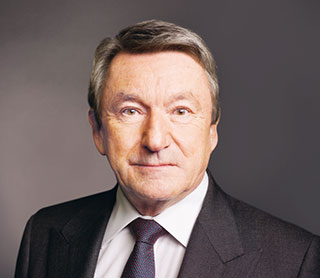
Ernst Tanner (CH) Mr Tanner was elected as CEO and Vice Chairman by the Board of Directors in 1993. In 1994, he became Chairman of the Board. He completed a commercial education and thereafter attended Business schools in London and in Harvard. Before joining Lindt & Sprüngli, Mr Tanner held top management positions for more than 25 years with the Johnson & Johnson Group in Europe and in the USA, his last position having been Company Group Chairman Europe. Mr Tanner has been a member of the Board of Directors of the Swiss Swatch Group since 1995, Vice Chairman of the Board of Directors since 2011 as well as member of the Compensation Committee since 2002 and Chairman of this Committee since May 2014. He also has a seat on the Advisory Board of the German Krombacher Brauerei GmbH & Co. KG. Until mid 2013, he was a member of the managing board of the Zurich Chamber of Commerce.
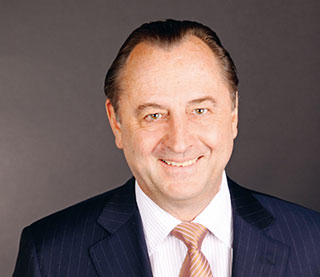
Dr Rudolf K. Sprüngli (CH) Mr Sprüngli completed his studies with a doctorate in economics and has been a member of the Board of Directors since 1988. Due to his former executive activities for the Group and for an international premium food-trading company, Mr Sprüngli is an expert authority in the chocolate business. Today, he manages his own consulting firm. Mr Sprüngli is also a member of the Board of Directors of Peter Halter Liegenschaften AG and Communicators AG, advisor at the Institut für Wirtschaftsberatung as well as Chairman of Freies Gymnasium Zurich.
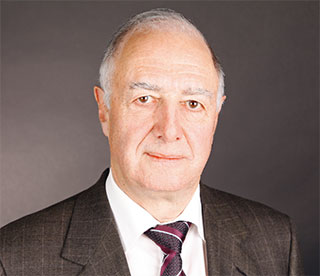
Dr Franz Peter Oesch (CH) Mr Oesch completed his studies with a doctorate in law and was appointed to practise as an attorney-at-law in the canton of StGallen in 1972. He has been a partner of the law firm “swisslegal asg advocati” in StGallen since 1971. His membership in the Board of Directors dates back to 1991. Furthermore, Mr Oesch held office as Chairman of the Board of Directors of the StGaller Kantonalbank from 1996 until mid 2013. Since 2014, he is Chairman of the Board of Directors at Kunert Group (Swiss), Corazza AG St. Gallen and Corazza AG Gossau, Obega AG as well as Woerner Tribotechnik AG
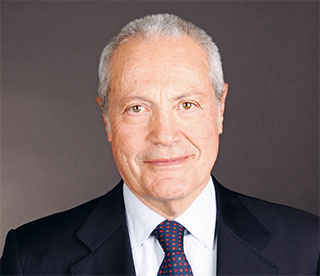
Antonio Bulgheroni (IT) Mr Bulgheroni has been a member of the Board of Directors since April 1996, Lead Director since February 2009 and he is currently appointed in the Executive, Audit and Compensation Committee. His extensive experience in company management in every area of the chocolate business makes Mr Bulgheroni a highly respected international expert in the chocolate industry. He was CEO of Lindt & Sprüngli SpA from 1993 until his retirement from executive directorship in April 2007. Since then he has been Chairman of the Board of Lindt & Sprüngli and Caffarel, the two Italian subsidiaries of the Group. Mr Bulgheroni, who is qualified with the Order of Merit for Labour of the Italian Republic, is the Vice President of Banca Popolare di Bergamo and holds other directorships including Il Sole 24 Ore and the L.I.U.C. University as well Bulgheroni SpA.
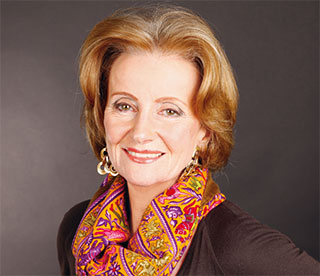
Dkfm. Elisabeth Gürtler (AT) Ms Gürtler has been a member of the Board of Directors since 2009. She completed her business-science studies with a master's degree, and subsequently acquired an outstanding reputation in particular as manager of the world-famous Sacher Hotels in Vienna and Salzburg, in an area in which premium quality plays a key role. Ms Gürtler was from 1998 till 2012 a member of the Supervisory Board of Erste Group Bank AG. Since 2004, she is a member of the general council of the Austrian National Bank as well as member of the Board of Directors of ATP Planungs- und Beteiligungs AG in Innsbruck. Since 2007, she has also been Managing Director of the Spanish Riding School in Vienna.
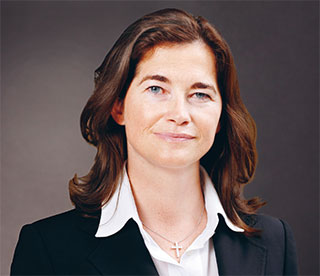
Petra Schadeberg-Herrmann (D) After periods of study in Paris and London, Ms Schadeberg-Herrmann completed her studies at the European Business School in Germany in 1990 with a degree in business management. She has been employed by the Krombacher Brewery Group of Companies for more than 20 years and is currently a managing partner. Krombacher is the leading brand on the German beer market. Ms Schadeberg-Herrmann is active primarily on the financial and commercial side. Among her other duties as managing partner she is in charge of Krombacher Finance GmbH. In June 2011 she was elected to the Supervisory Board of Krones AG and in April 2013 to the Supervisory Board of Commerzbank AG.
number of permitted activities outside the group—The number of mandates in the senior managing bodies and boards of directors of legal entities which are to be entered in the Swiss commercial register or in a comparable foreign register outside the Group is restricted for the members of the Board of Directors to four mandates in listed companies, ten mandates in non-listed companies and fifteen mandates in other legal entities such as foundations and associations.
Internal organization—In the year under review, the Ordinary General Meeting elected for the first time the Chairman of the Board of Directors and the members of the Compensation Committee. In other respects, the Board of Directors will remain self-constituting.
If the chairmanship is abandoned prematurely, or if the chairman is dismissed from the Board of Directors or retires from the Board before ending the term of office, the Board of Directors can appoint an interim chairman from among its members until election at the next General Meeting. In case one or more members of the Compensation Committee prematurely retire, the Board of Directors can appoint substitutes from among its members until the next General Meeting.
The Chairman presides over the General Meeting, represents the company in dealings with third parties and, in cooperation with the Delegate of the Board of Directors, the Group Management and the Extended Group Management, provides timely information for the Board of Directors on all matters which are important for the decision-making process and monitoring of significant aspects of the company. He is responsible for preparing all the matters to be dealt with by the Board of Directors, for placing them on the agenda and for convening and chairing meetings of the Board of Directors.
The Delegate of the Board of Directors (CEO) is entrusted with the task of managing the business jointly with the Group Management and is assisted by the Extended Group Management. He is Chairman of the Group Management. Further details of the tasks of the CEO, the Group Management and the Extended Group Management will be found on page 40 of this annual report.
The Board of Directors may also appoint a non-executive member from its ranks to serve as the Lead Director. The Lead Director, who was appointed for one year, is entrusted with the task of safeguarding the independence of the Board of Directors in relation to the Chairman and CEO if both these functions are held by the same member of the Board of Directors. If necessary, the Lead Director has authority to convene and chair a meeting of the Board of Directors himself which will not be attended by the Chairman and CEO. He must notify the outcome of any such meeting to the Chairman and CEO.
The Board of Directors of Chocoladefabriken Lindt & Sprüngli AG is firmly convinced that the dual mandate of Ernst Tanner as Chairman of the Board and CEO ensures effective leadership and excellent communication among shareholders, the Board of Directors, and the Management. Leading corporate governance practice also recognizes that a dual mandate of Chairman of the Board and CEO can be advantageous for a company, if the company provides for the appropriate control mechanisms. These comprise a majority of non-executive Board members, Board Committees (Audit Committee, Compensation & Nomination Committee, and Corporate Social Responsibility Committee), each consisting of non-executive or a majority of non-executive Board members, as well as the appointment of a non-executive, experienced member of the Board of Directors as Lead Director. With the appointment of Antonio Bulgheroni as Lead Director, Chocoladefabriken Lindt & Sprüngli AG has introduced the latter control mechanism.
The Board of Directors meets regularly and as often as business requires it, but at least four times each year. Meetings are convened by the Chairman or by another member of the Board of Directors appointed to represent him or by the Lead Director. Each member of the Board of Directors is authorized to ask for a meeting to be convened without delay, while stating the purpose. The Chairman or in his absence another member of the Board of Directors authorized to represent him or the Lead Director presides over the meeting. Apart from the members of the Board of Directors, the meetings may likewise be attended by members of the Group Management and other non-members. In the year under review, four regularly meetings were held; one member was not present at a regular meeting. Each meeting generally lasted for four to five hours. Members of the Group Management regularly attended these meetings. Two extraordinary meetings were held in 2014; one member was not present at one extraordinary meeting. No other external consultants took part in meetings of the Board of Directors.
Committees of the Board of Directors—The Board of Directors is assisted in its work by three committees: the Audit Committee, the Compensation & Nomination Committee, and the Corporate Sustainability Committee. The Board of Directors may decide at any time by a majority decision to set up further committees. Until that time, all other tasks of the Board of Directors in particular in the areas of corporate governance, communication, relations with investors, and shareholders will continue to be performed by the whole Board of Directors.
Audit Committee—The Audit Committee consists of three members of the Board of Directors. At least two of them, together with the Chairman, must be non-executive members of the Board of Directors. The CFO has a consultative vote in the committee.
Until the general meeting of April 24, 2014, the following persons are members of the Committee: Dr Franz Peter Oesch (Chairman), Dr Rudolf K. Sprüngli, and Antonio Bulgheroni. Following the general meeting, the Committee membership was as follows: Dr Franz Peter Oesch (Chairman), Antonio Bulgheroni and Petra Schadeberg-Herrmann.
The members of the committee possess sufficient experience and professional knowledge in the areas of finance and risk management to enable them to perform their tasks effectively.
The Audit Committee supports the Board of Directors in its function of strategic supervision, with particular reference to the main audit areas, complete presentation of the financial statements/audit findings, compliance with statutory requirements, and the services of the external auditors. In addition, the committee assesses the expediency of the financial reporting and internal control system. It ensures ongoing communication with the external auditors. Likewise, it keeps the risk management principles of the Group, and the appropriate nature of the risks taken under constant review, especially in the areas of investments, currencies, raw material procurement, and liquidity.
The Audit Committee makes recommendations to the Board of Directors for important decisions in the aforementioned matters, such as the approval of risk management principles, adoption of the annual accounts statement or proposals for the appointment of the statutory auditor. The committee itself has no decision-making powers. It may, however, decide independently to entrust the auditor with special assignments and approve the fee budget for audit tasks submitted by the external auditors.
The committee meets as often as business requires, but at least four times a year. In 2014, four regularly scheduled meetings were held; one member was not present at a regular meeting. The meeting generally lasted between one and two hours. Members of the Group Management regularly attended these meetings. The auditors attended meetings of the Audit Committee on one occasion. Direct access for the auditors to the Audit Committee is guaranteed at all times. No external consultants took part in meetings of the Board of Directors in the year under review.
Information on the auditor see page 45
Compensation & Nomination Committee—The Compensation & Nomination Committee consists of three non-executive members of the Board of Directors, each of whom was elected in the year under review for the first time by the general meeting for a term of office of one year until the end of the next ordinary general meeting. Until the general meeting of April 24, 2014, the Committee membership is as follows: Dr Kurt Widmer (Chairman), Antonio Bulgheroni, and Elisabeth Gürtler, graduate businesswoman. Following the general meeting, the members were Dr Rudolf K. Sprüngli (Chair), Antonio Bulgheroni, and Dkfm. Elisabeth Gürtler.
Information and responsibilities of the Compensation & Nomination Committee see compensation report p.47
Corporate Sustainability Committee—The Corporate Sustainability Committee consists of three members of the Board of Directors. These may be both executive and non-executive members of the Board of Directors. The CFO attends the meetings.
Until the general meeting of April 24, 2014, the Committee membership is as follows: Dr Rudolf K. Sprüngli (Chairman), Dr Kurt Widmer, and Ernst Tanner. Following the general meeting, the members were: Dr Rudolf K. Sprüngli (Chairman), Antonio Bulgheroni and Ernst Tanner.
The Corporate Social Responsibility Committee supports the Board of Directors in setting the strategic direction for the activities of the company, whilst aiming for comprehensive sustainable management. Furthermore, it is responsible for the development and adaption of all globally valid corporate policies in this area, and monitors compliance in the legal aspects. The committee has a preparatory as well as consultative role. It meets as often as business requires, at least once a year. One regularly convened meeting took place in the year under review and lasted for around two hours. The CFO attended this meeting. No external consultants were present at this meeting.
Allocation of competences—The essential principles for allocating the competences and responsibilities among the Board of Directors and the Group Management are set forth in the organizational regulation. Below is a summary of the basic principles:
Board of Directors:
- Performs the inalienable statutory tasks. The Board of Directors is therefore responsible for strategic management of the company, giving the necessary instructions and supervising the Management
- Determines strategic, organizational, accounting, and financial planning guidelines
- Changes to the legal structure of the Group (especially incorporation of new subsidiary companies, acquisitions, joint ventures, as well as liquidation of companies)
- Appointment and dismissal of the Chairman, the delegate, the secretary, and the Lead Director of the Board of Directors together with the members of the Group Management, the Extended Group Management, and Chief Executive Officers of the subsidiary companies
- Approves the budgets for the Group and the individual subsidiaries
The Board of Directors has assigned the management of day-to-day business to the CEO and Group Management on the basis of the organizational regulation. They are supported by the Extended Group Management.
CEO—The CEO is the Chairman of the Group Management and responsible for procurement and forwarding of information to the Group Management, the Extended Group Management, and the members of the Board of Directors. The CEO must also ensure that the decisions and instructions of the Board of Directors are acted upon by the Group Management and Extended Group Management. Last but not least, he is responsible for managing the operational business of the Group within the framework of its strategic objectives, and for the planning of the entire business and reporting within the Group.
Group Management—The Group Management is responsible for the implementation of the Group strategies. In addition, the individual members of the Group Management must lead their allocated functional and responsibility areas within the framework of the Group policy and in compliance with the instructions given by the delegate of the Board of Directors. On the basis of a matrix structure, the individual Group Management members are given line responsibility for entire country organizations and geographical areas, together with functional responsibility for specific areas.
For details of the members of the Group Management, see page 41
Extended Group Management—The members of the Extended Group Management perform the duties entrusted to them by the Chairman of the Group Management or by members of the Group Management in the area of country /market responsibility (looking after foreign subsidiary companies and providing services for them) and / or functional responsibility. The members of the Extended Group Management may assume additional responsibility in the capacity of Managing Director/CEO of a subsidiary company or at Group level with pure market / country responsibility and / or functional responsibility.
For details of the members of the Extended Group Management, see page 43
Information and controlling instruments — The Board of Directors is kept regularly informed of all important matters relating to the business activity of the Group. Members of the Group Management attend the meetings of the Board of Directors and report on the latest state of business and on important projects and events. Extraordinary occurrences are called to the attention of the members of the Board of Directors without delay. To obtain a direct picture of the market situation, the Board of Directors regularly visits national companies and meets the local business management.
The Board of Directors will be kept informed in writing on a quarterly basis by means of an extensive and complete Management Information System (MIS) about profit and loss, balance sheet, cash flow, investments, and personnel both of the Group and the subsidiaries. The information is provided both on a historical basis and as a year-end forecast.
Furthermore, the members of the Board of Directors receive, on an annual basis, a detailed overall budget, together with a three-year medium-term plan with forecasts of the future development of the individual subsidiaries and the consolidated group of companies, covering the income statement, profit and loss, balance sheet, cash flow, investments, and personnel. An annually updated Group-wide analysis of the strategic, operational, and financial risks – including valuations, actions taken to limit risks, and responsibilities – will also be presented.
To enable the risk parameters of the Group to be assessed, the Audit Committee also receives a quarterly report on securities and cash investments, currencies, raw material procurement, and liquidity (risk control reporting). Members of the Group Management regularly attended the meetings of the Audit Committee. The Group has no internal audit department. Accordingly, the internal financial control system, the management information and risk management reporting of the Group is given very special attention.
Each year, a report is submitted to the Audit Committee on the internal financial control processes in the various corporate functions of the subsidiary companies (IT, Procurement, Production, Sales, Salary payments, Treasury, HR, and Financial Reporting). Within the framework of the yearly audit, the auditors may be charged with special assignments, which go over and beyond the legal and statutory requirements.

